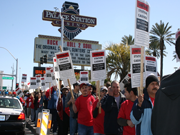Update on Stations Casinos

UNI Global Union has already published some information about the illegal actions of Station Casinos.
UNITE HERE (UNI's affiliate in the US) has reported the National Labor Relations Board (NLRB) began to prosecute its Unfair Labor Practice case against Station Casinos, Inc. in front of Administrative Law Judge Geoffrey Carter. The NLRB's complaint against the dominant Las Vegas locals casino operator and the third-largest private employer in Las Vegas has grown to include more than 165 charges, the most ever against a Nevada gaming company. The NLRB alleges that, from February 19 through August 31, the company has illegally used threats, intimidation, interrogation, surveillance, bribery, discouragement, discrimination, discipline and physical assault against employees engaged in lawfully protected union activities. The hearing is expected to last several weeks as Station workers testify in the government’s case against the company.
"People will see clearly now that Station is a very anti-union company that is trying to do everything it can to stop us from having a voice on the job and winning a better life for our families," said Norma Flores, a food runner at Fiesta Henderson and one of the Station Casinos Organizing Committee members who will testify as a government witness in the hearing.
"We certainly hope Station Casinos will not retaliate against any of the workers who are brave enough to testify against the company during the NLRB hearing," said Geoconda Arguello-Kline, President of the Culinary Union Local 226. "It is bad enough that Station is running an aggressive anti-union campaign, which has led to this massive NLRB complaint. It will be adding insult to injury if it punishes workers further for speaking out against allegedly illegal behavior by their supervisors and managers."
In February 2010, workers from Station Casinos' ten major properties in the Las Vegas area formed the Station Casinos Organizing Committee to demand that the company allow Station workers to exercise their right to decide whether to unionize.

